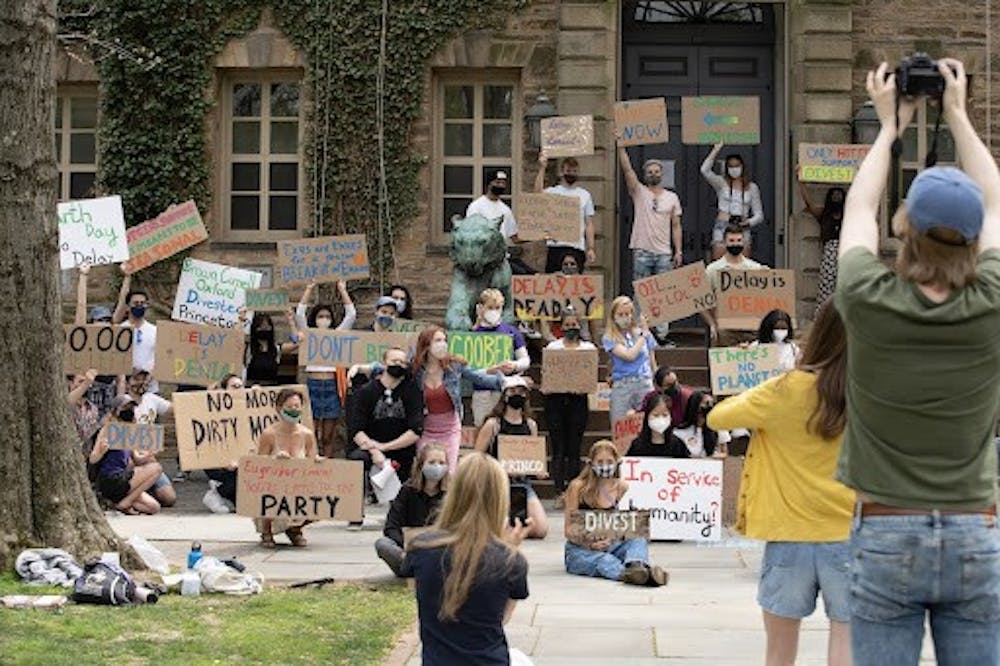“St. Petersburg is the 2nd most vulnerable city to sea-level rise in the country … My children will not have a future if my city is flooded,” Bryce Springfield ’25 told me as he held a large banner stating “Climate Action Now” at the Divest Princeton sit-in last Friday.
Despite the passion that the students who attended had, the sit-in’s turnout felt quite underwhelming. It seemed to me that more people posted the Divest Princeton’s sit-in Instagram post on their stories than the number of people that actually attended. The responses to the 2020 USG referendum question and the most recent Frosh Survey on the divestment from fossil fuels show that there is a significant discrepancy between the number of people who support fossil fuel divestment and the number of people who were present at the sit-in.
What is the best way to actually inspire others to act for divestment? By doing exactly what students at the sit-in did: sharing why climate action is important to you. By identifying ways climate change affects you and having conversations with the people around you about those ways, the technical terms of “fossil fuel divestment” and “climate” seem much more personal.
A personal connection makes people more passionate about an issue. Two studies done by the Yale Program on Climate Communication found that listening to a radio story describing an emotional telling of the impacts of climate change led to a better effect on a person’s climate beliefs, risk perceptions, and reactions of worry and compassion. This tells us that stories are one of the most powerful detonators for climate action.
During the sit-in, I interviewed several students on why they support divestment from fossil fuels. All students interviewed responded with stories about how climate change has impacted their personal lives. Martin Mastnak ’25 talked to me about his experience living in Southern California, where droughts are a big concern, and how his Balkan heritage has led him to become involved with a movement to stop the proposed Rio Tinto lithium mine in Serbia.
Similarly, Braiden Aaronson ’25 stated, “Coming from the South, you can just take the destruction caused by any hurricane in recent history … Each one shows us a glimpse into our futures.”
More than anything else, this shows how nearly everyone has something to talk about in their personal lives regarding climate change. As part of an institution that has people holding power across many disciplines across the globe, talking about climate change within “The Princeton Bubble” has big implications beyond FitzRandolph Gate. This crisis encompasses a large range of issues and should be tackled in a myriad of ways. The more people talk about an issue, the more people in different fields will take an active stance in fighting against it, and the more ways an issue as large and overwhelming as the climate crisis will be addressed.
The influence universities have on the environmental movement has never been more apparent, given Harvard’s announcement that it will be divesting from fossil fuels and the ripple effect that ensued within other universities. As a response to Harvard’s announcement, multiple students expressed their concerns about how “embarrassing it is that other universities are leading before us” (Bryce Springfield ’25). It is outrageous that a university that prides itself on forming leaders and being “in the service of humanity” prioritizes profits before the livelihoods of people across the globe, including their own students.
Now more than ever, with Divest Princeton’s efforts bearing fruit last spring with the Council of the Princeton University Committee’s (CPUC) Resources Committee’s recommendation of conditional divestment from fossil fuels backing up the movement, I urge the Princeton community to think about climate change as a more personal issue and to speak up more in their everyday lives to foster a community that recognizes the urgency of the climate emergency.
Isabella Checa is a freshman from Quito, Ecuador. She can be reached at ic0707@princeton.edu.









